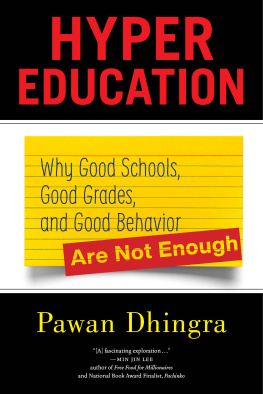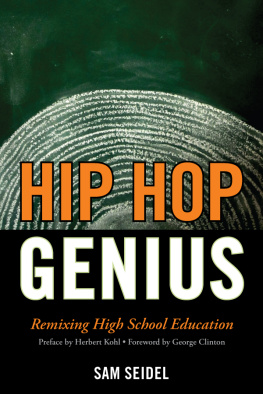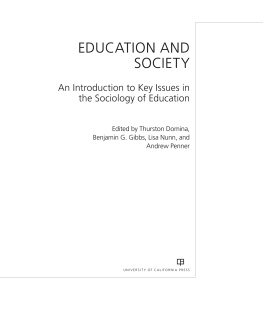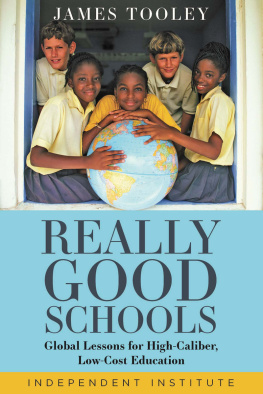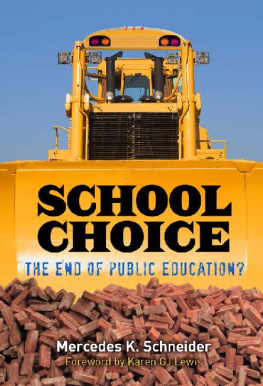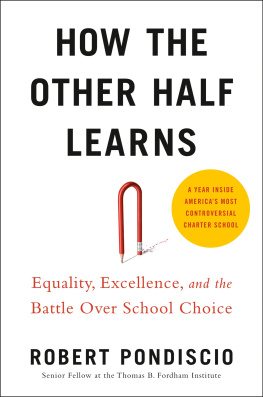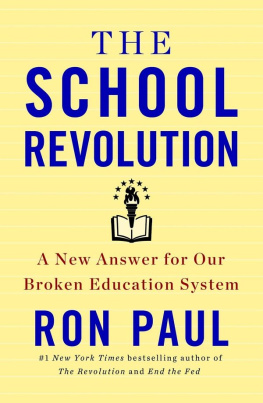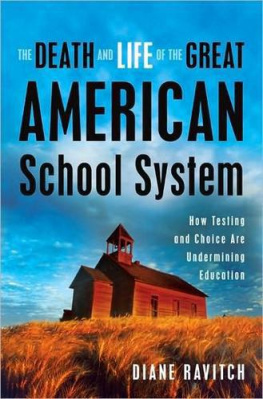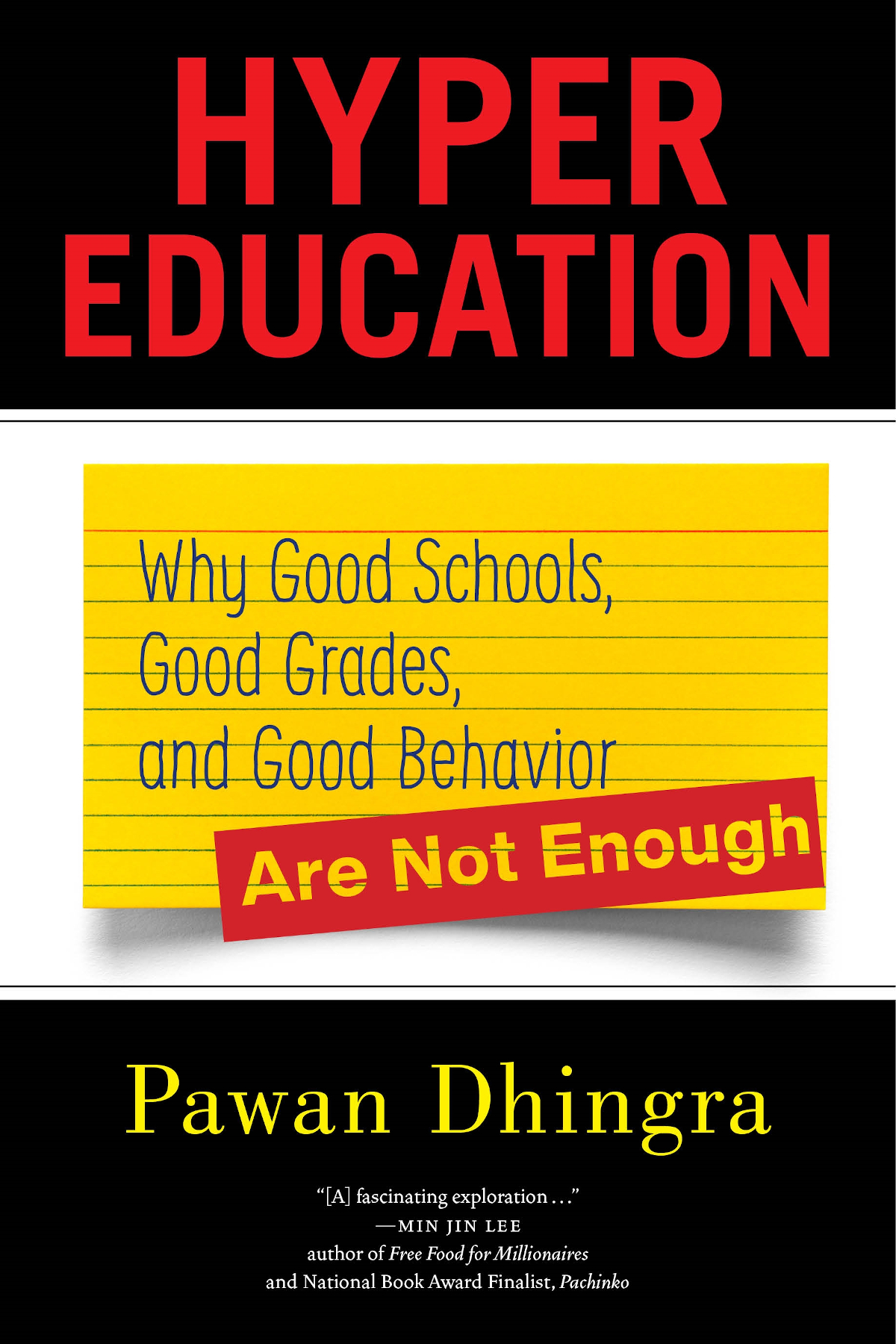
Hyper Education
Hyper Education
Why Good Schools, Good Grades, and Good Behavior Are Not Enough
Pawan Dhingra

NEW YORK UNIVERSITY PRESS
New York
NEW YORK UNIVERSITY PRESS
New York
www.nyupress.org
2020 by New York University
All rights reserved
References to Internet websites (URLs) were accurate at the time of writing. Neither the author nor New York University Press is responsible for URLs that may have expired or changed since the manuscript was prepared.
Material in chapter 3 appeared in Pawan Dhingra, 2018, What Asian Americans Really Care about When They Care about Education. Sociological Quarterly, 59, 2: 30119.
Material in chapter 5 appeared in Pawan Dhingra, 2019, Achieving More Than Grades: Morality, Race, and Enrichment Education, American Journal of Cultural Sociology 7, 3: 27598.
ISBN: 9781479831142 (hardback)
For Library of Congress Cataloging-in-Publication data, please contact the Library of Congress.
I dedicate this book to my family, both nuclear and extended. It is with you that I want to continue to live and grow. Thank you.
Contents
The Growth of Extracurricular Education
Your next word is zubrowka, the announcer said to Rita, the thirteen-year-old girl standing on stage at the microphone, in front of now empty rows of chairs where other competitors had sat. This was the spelling bee national championship, with children from all over the country, even from abroad. In previous rounds, this same child had knocked out words. This time, though, her eyes were wide open and she looked lost.
May I have the part of speech?
Its a noun.
May I have the definition?
It is a dry, straw-colored Russian liquor that is distilled from rye.
After a few more questions, Rita held her palms together over her nose and mouth and stared down at the floor. Her father, Sunil, sitting in the audience, also stared at the floor. A friend held Ritas mother, Sharmistha, in her arms as they waited. Rita then started in an almost pleading voice, Zubrowka. Z-U-B-R-O-W-K-A. Zubrowka.
Confetti showered down! Sunil rushed on stage. Sharmistha stood up from her chair but stayed back. Rather than join her daughter on stage, she wiped tears from her eyes. Ritas spelling coach had an enormous grin and gave Sharmistha a hug. The television crew zoomed in on the champion. She received an oversized check for $10,000.
Rita had beaten other highly competitive spellers, all winners in their own right. To make it to the national competition, spellers had to win or place second in one of the regional spelling bees held across the country, such as in Boston, New York City, Chicago, Orlando, Atlanta, Houston, Phoenix, Los Angeles, San Francisco, Seattle, and elsewhere. Families had flown or driven to the finals, mostly paying their own way. An hour after the victory, a dance party was in full force for all the spellers and their families, who were celebrating making it to the finals and letting off some steam.
Yet this is a competition almost no one knows of. It is not the Scripps National Spelling Bee, held annually in late May in Washington, DC, and broadcast live on ESPN. Rita will not make the news rounds, appear on late-night comedy talk shows, or meet the president of the United States, as the Scripps winner often has. Rita won the 2016 South Asian Spelling Bee in New Jersey, a bee constructed by and for South Asian Americans and composed almost exclusively of Indian American children. One must have a parent or grandparent of South Asian origin in order to participate.
Nor is this the only national spelling bee circuit by and for South Asian Americans per se. The North South Foundation (NSF) offers multiple competitions beyond just spelling bees in cities across the country, including math, geography, and more. In my research for this book, I volunteered as a spelling-bee pronouncer for children in grades four through eight for the NSF Boston regional competition held at a local university outside of the city. (There is a separate competition that day for children in grades one through three.) Parents sat in the back of a classroom while around twenty kids sat at desks up front. Two volunteer judges sat at a table in the front of the room, facing the participants and parents. I stood next to them at a podium and read the competition words. I was terrified. I tried to correctly pronounce words I had never heard of; I had prepared in the backstage volunteer classroom by using a pronunciation app on my phone. Parents could challenge results if they thought a word was mispronounced or judged incorrectly. Luckily, no one felt the need to challenge me, but I wouldnt have blamed anyone if they had. Some had traveled hours just for this regional competition. Parents even petition for their kindergarteners to be eligible to compete despite rules that restrict entrance to first graders.
Some joke that the Scripps National Spelling Bee is practically an Indian-only event (it is the Indian Super Bowl, according to comedian Hari Kondabolu). Since 1999, Indian Americans have won all but four Scripps bees, and they have won every one since 2008. This follows champions in 1985 and 1988. In the 2017 Scripps bee, thirteen of the fifteen finalists were Indian American, as was the champion, with Indian American champions again in 2018 and 2019. In fact, in 2014, 2015, and 2016, there have been two co-champions, each of Indian descent. The last time there had been co-champions before 2014 was in 1962. Remarkably, in 2019, there were eight co-champions, seven of whom were Indian American. They are breaking the bee, to quote the title of a documentary on Indian spelling-bee youths. This is despite the fact that for the 2016 match, Scripps made the final round longer and included more challenging words (already nearly impossible to spell for almost everyone) in order to prevent co-champions.
Indian Americans currently are dominating other academic competitions as well. In 2018, Venkat Ranjan, an eighth grader from California, won the National Geographic Bee, becoming the seventh-straight Indian American to win that competition. The 2019 winner was Nihar Janga, who also co-won the Scripps National Spelling Bee in 2016. As BBC News put it, From 2005 [to 2016], the winning rate of Indian-origin children in [the Scripps National Spelling Bee and the National Geographic Bee] has been well over 80%.
Indian Americans have become the latest and most prominent version of the Asian American model minoritythat is, a minority group praised for its achievements (most notably in academics), in contrast to popular opinions on African Americans and Latinxs. Along with children (mostly boys) of well-educated Chinese and Korean immigrants, they also dominate math and science competitions. For instance, MATHCOUNTS is a national competition for sixth, seventh, and eighth graders. The finalists and champions routinely are Asian American boys. In the 2016 finals, the top twelve contestants were Asian American boys except for one white boy. In 2017, 2018, and 2019, the results were largely consistent with this trend. Many more math and science competitionssuch as the American Mathematics Competitions, Math Kangaroo, Math Olympiads, International Science and Engineering Fair, Regeneron Science Talent Search, United States of America Mathematical Talent Search, and so onhave comparable results.
Nor is extracurricular education limited to competitions. Private learning centers specializing in math have seen tremendous growth in recent years. All types of kids attend these classes once or twice a week, much like children attend gymnastics, soccer, or other extracurricular activities.
Next page
